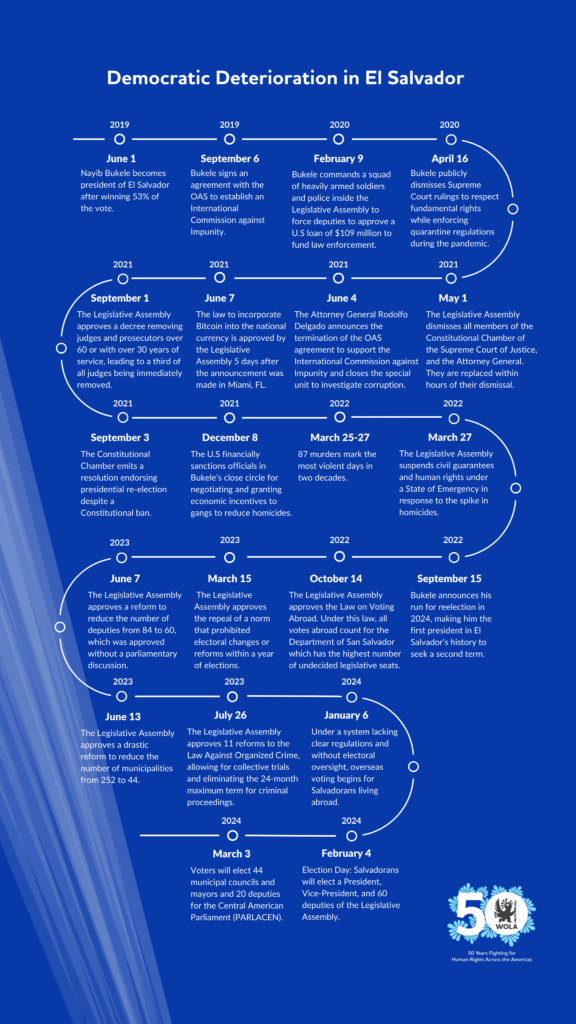El Salvador has not held presidential and legislative elections simultaneously since 2009. Now, in a context of serious human rights violations and a profound deterioration of the rule of law, Salvadoran citizens will elect a president, vice-president, and deputies of the Legislative Assembly on February 4, 2024, and mayors and deputies to the Central American Parliament on March 3. In the months leading up to the elections, several changes and reforms affecting the electoral process have come into effect. But the democratic backsliding is a process that started years ago.
Here we highlight key measures taken by President Bukele that rapidly led to the deterioration in the rule of law and democratic values since he took office in 2019.

The Inter-American Court of Human Rights, among other bodies, has established a series of guidelines that define electoral integrity and are the basis for free, fair, and transparent elections. It has been pointed out that for elections to be integral, judicial guarantees, greater transparency, an independent electoral administration, security and publicity of the vote count, equity of resources to compete, and clarity of the electoral legal norms are required.
El Salvador has failed to comply with these minimum standards for the exercise of political rights, as exemplified below:
- Unconstitutional re-election: Bukele ran for presidential re-election despite the Constitution prohibiting it in at least six articles. The OAS Secretary General requested an advisory opinion from the Venice Commission on re-election, which concluded that re-election is not a human right and that “a decision to alter or remove presidential term limits should be subjected to thorough public scrutiny and debate, and should fully respect the relevant constitutional and legal procedures.”. The re-election is based on a resolution of the Constitutional Chamber, and because Bukele holds immense popularity due to his repressive security policies (90 percent approval), there was no major reaction from the population.
- Absence of checks and balances in the branches of government: There is a high concentration of power in the hands of current president Nayib Bukele and his party, Nuevas Ideas, which maintains control of the Legislative Assembly with 55 of the 84 seats. Likewise, a series of actions show that there have been constant threats and interferences in the judiciary by President Bukele, which limit the guarantees of independence.
- Electoral Reforms that benefit Bukele and his party: Only eight months before the election, the Legislative Assembly passed a reform that introduced a new method of counting votes. The D’Hondt formula is a proportional seat allocation system, which, for many analysts, implies favoring the majority parties. This could even go against the pluralistic system of political parties guaranteed in the Inter-American Democratic Charter because there is a high risk that Nuevas Ideas -Bukele’s party- will become the only ruling party in the Assembly, leaving out the political opposition necessary in any representative democracy. Many of the 13 contending parties may disappear after the election if they fail to reach 50,000 votes or win a seat in the Assembly.
- Institutional electoral weakness and lack of clarity on overseas voting: There have been public indications of the lack of credibility and independence of the Supreme Electoral Tribunal (TSE) magistrates, as well as limited technical capacities for the supervision of campaign financing, control of the media, and, mainly, to regulate overseas voting. Salvadorans living abroad will be able to cast their vote in two modalities: a) remotely via the internet or b) in person at consulates (electronic), but there is no certainty whether the feasibility of storing facial authentication images of voters for post-results audits was considered.
- Lack of transparency and access to public information: There has been a severe setback in access to public information on the electoral process. Three commissioners of the Institute for Access to Public Information were sanctioned by the U.S. government for “purposefully and wrongfully blocking access to public information.” Observers have also denounced the lack of transparency, especially on the risks of illegal use of public funds for campaigning, illicit electoral financing, and corruption.
In this context, it is essential that the international community join efforts to defend the democratic order in El Salvador and call for:
- Strengthening civic space, freedom of the press, and expression. Due to the constant threats to electoral integrity, it is necessary to support the key role of civil society in safeguarding democracy.
- Protecting the work of both national and international electoral observation. Groups such as “Observa El Salvador,” composed of a consortium of six academic institutions and civil society, will monitor and evaluate the process.
- Restoring constitutional guarantees and putting an end to the state of exception that has not only seriously affected human rights but also generated a lack of legal certainty.
- The international electoral observation missions of both the Organization of American States and the European Union to issue substantial recommendations to, for example, prevent indefinite re-election that threatens the alternation of power, an essential pillar of representative democracy. As well as document irregularities or practices that put civil rights at risk.